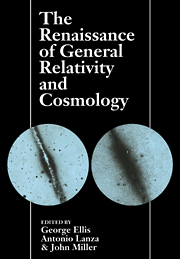 The Renaissance of General Relativity and Cosmology
The Renaissance of General Relativity and Cosmology Published online by Cambridge University Press: 15 December 2009
… we seek a theory which describes all that actually happens, and nothing that does not, a theory in which everything that is not forbidden is compulsory.
The Unity of the Universe D. W. Sciama (Faber & Faber, 1959)The clustering of galaxies on scales < 5h-1Mpc1 shows some remarkable scaling properties which somehow arise out of nonlinear gravitational self-organisation. This scaling is characteristic of structures that are referred to as multifractals. There are several ways of looking at these structures each providing their own special insights into the nature of the clustering. Multifractal scaling can be shown to be closely associated with the fact that galaxy counts-in-cells are approximately Lognormally distributed and with hierarchical fragmentation processes. Moreover, the statistical moments of the galaxy distribution scale in a way that is reminiscent of the renormalization group. This may throw light on the nature of the underlying dynamics of the nonlinear gravitational clustering process.
INTRODUCTION
When Dennis Sciama published his book “The Unity of the Universe” in 1959, the great debate was which theory of the Universe was the correct one: the “Big Bang” or the “Steady State”? Dennis had been a member of a group of Steady-State enthusiasts at Cambridge in the early 1950's.
To save this book to your Kindle, first ensure [email protected] is added to your Approved Personal Document E-mail List under your Personal Document Settings on the Manage Your Content and Devices page of your Amazon account. Then enter the ‘name’ part of your Kindle email address below. Find out more about saving to your Kindle.
Note you can select to save to either the @free.kindle.com or @kindle.com variations. ‘@free.kindle.com’ emails are free but can only be saved to your device when it is connected to wi-fi. ‘@kindle.com’ emails can be delivered even when you are not connected to wi-fi, but note that service fees apply.
Find out more about the Kindle Personal Document Service.
To save content items to your account, please confirm that you agree to abide by our usage policies. If this is the first time you use this feature, you will be asked to authorise Cambridge Core to connect with your account. Find out more about saving content to Dropbox.
To save content items to your account, please confirm that you agree to abide by our usage policies. If this is the first time you use this feature, you will be asked to authorise Cambridge Core to connect with your account. Find out more about saving content to Google Drive.